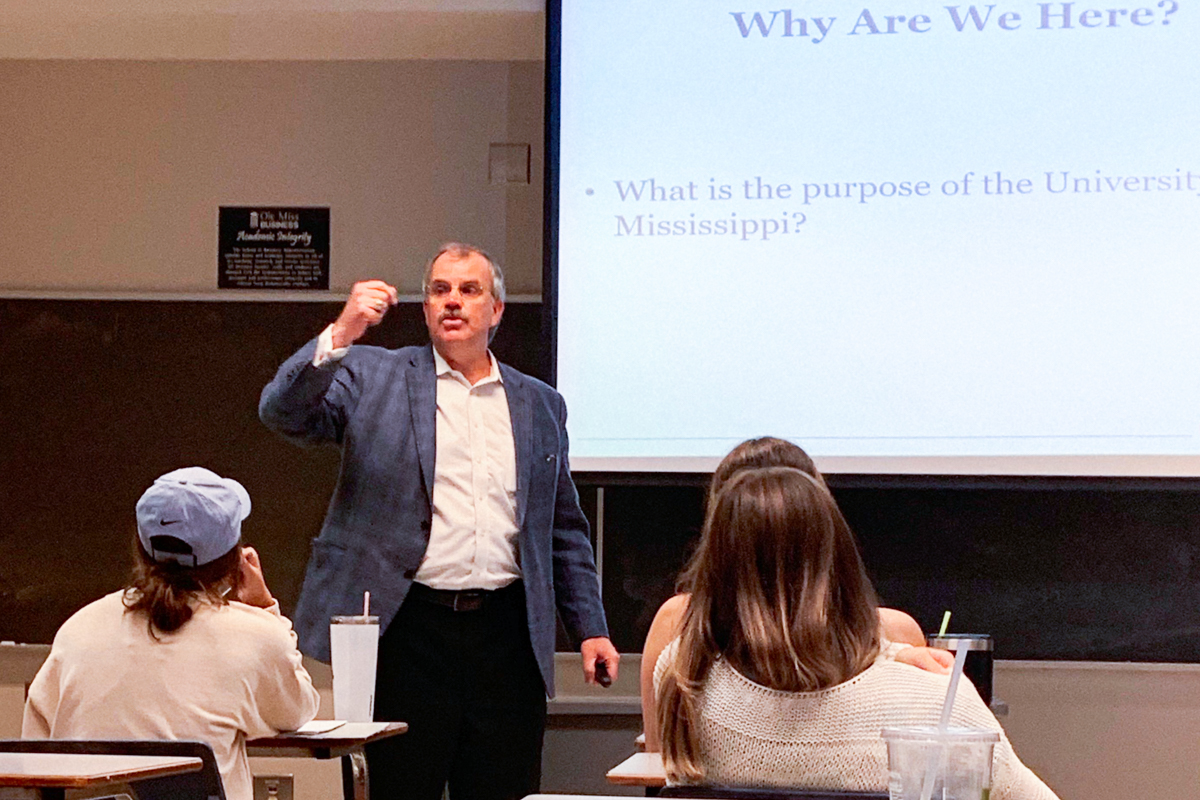Members of the University of Mississippi faculty fear the school’s effort to root out whistleblowers who exposed issues of racism in the administration could also expose private information about employees and graduate students who have confided concerns to the university ombudsman.
Two faculty members told the Mississippi Free Press that they worry the university could be laying the groundwork to eliminate Ombudsman Paul Caffera’s office, which one described as a “last refuge” for employees.
“If they took that Ombuds office away, there would be nowhere for faculty to go. Nowhere,” said Aaron Jones, whose name has been changed to protect his or her identity. “That’s the only place we have on campus. And I’m very fearful that they’re going to—I know they’re coming for Paul.”
The mounting disquiet comes as school officials are attempting to compel the ombudsman to turn over information that they hope will lead to the whistleblowers who played a pivotal role in this publication’s “UM Emails” series. The initial three-part exposé, published in August, revealed a tangled web in which UM officials catered to certain wealthy donors’ often sexist and racist predispositions in order to procure money for the school.
But university faculty members, who had nothing to do with that saga but have sought the ombudsman’s services about other issues, say they worry the effort to identify and punish the whistleblowers could expose their identities, too.
“I think we’re all worried the university is going to get a hold of his communications and that our names will be revealed,” Jones told the Mississippi Free Press.
The faculty members previously confided to the Office of Ombuds, they said, partly to avoid professional retaliation from superiors if they brought matters forward elsewhere on campus.
Officials Turn Racism Claims on Whistleblowers
Since the Mississippi Free Press released the UM Emails report in early August, university officials have remained quiet about the officials involved in the emails, such as now-former UM School of Journalism and New Media Dean Will Norton, whom the Mississippi Free Press reported recently still earns almost $20,000 a month despite not teaching any classes this fall.
But the Office of Equal Opportunity and Regulatory Compliance, which handles Title IX employment issues, is now investigating vague claims that the whistleblowers are creating a “hostile work environment … on the basis of race and national origin and just in general.”
Ombudsman Caffera filed a lawsuit on Nov. 19 to block the EORC’s efforts to compel him to disclose information or to access his emails and private communications. The lawsuit, which this publication accessed online through Lafayette County court files, indicates that Caffera does not know the identities of the whistleblowers who requested and released the UM emails used in our August report. The Mississippi Free Press also does not know their identity.
“Caffera is not the author of the anonymous emails or social media posts, nor is he affiliated with any anonymous public interest whistleblower group, and he has no knowledge of who is affiliated with these groups,” the lawsuit says.
The whistleblowers are part of two anonymous groups known as “Ole Miss Information” and “Ole Miss Transparency.” Since the spring, some of the whistleblowers have sent a number of emails to administrators and faculty at the school, some containing attached copies of the racist and sexist correspondences between donors and administrators or links to the Mississippi Free Press UM email stories.
The Ole Miss Information whistleblowers have used a blog and social-media accounts to raise awareness about their concerns. In some emails, they urged faculty and leaders who have remained silent to speak up.
Other Ole Miss Information emails to faculty broached questions about other issues at UM, including whether seven professors received tenure-track promotions without requisite qualifications—a concern they also raised in emails to the the Office of the State Auditor and the Mississippi Institutions of Higher Learning, the state body that oversees and regulates the state’s public universities and colleges.
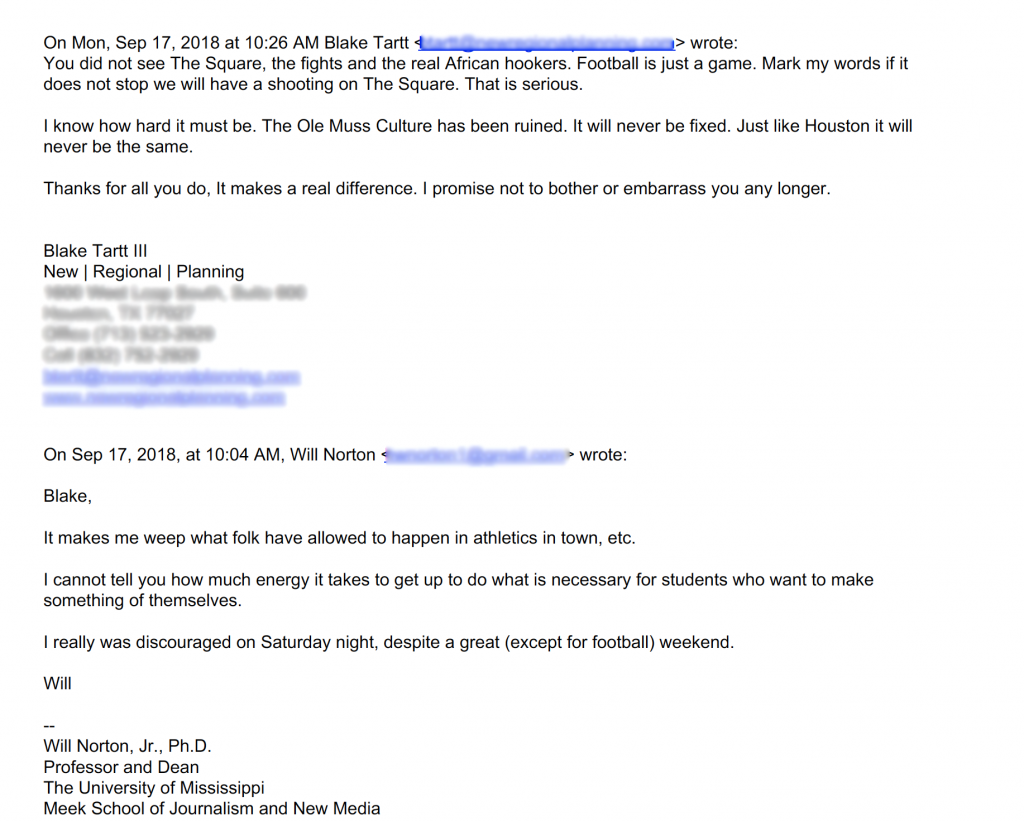
Most of the faculty members whose qualifications Ole Miss Information questioned in those emails were white, but one is African American. Some at the university who were already unhappy with the whistleblowers’ actions have latched onto that fact to allege that the whistleblowers who unearthed the racist emails are, themselves, intentionally targeting faculty members of color.
In an Oct. 23 letter to journalism faculty regarding recently launched investigations into the whistleblowers, Provost Noel Wilkin wrote that the whistleblowers had “increasingly created a chilling effect on faculty speech, dampened faculty collegiality, interfered with teaching and scholarship, and caused several to express they feel they work in a hostile environment.”
“While the EORC investigation takes place, I am exploring mechanisms to give faculty some relief from this barrage of anonymous allegations in the workplace,” wrote Wilkin, who would be involved in any appeals process should the EORC or another body take disciplinary action against any UM employees in relation to the whistleblower investigations.
Ole Miss Information says it consists of multiple individuals, including three who go by the names of characters in George Orwell’s classic dystopian novel, “1984.” They identify as Winston Smith, Julia Dixon and Emmanuel Goldstein.
“Smith” told the Mississippi Free Press over the summer in email that they chose the names to reference “a regime where truth doesn’t matter as much as blind loyalty to the leader and where covering up the truth has become instinctive.”
Wilkin has not returned multiple calls or responded to emailed requests for a phone interview to discuss the investigations and other related issues. In an email, though, the provost said he would “not be able to comment on any possible investigations or personnel matters.”
‘People Who Speak Up Get Hammered at This University’
Reached through his attorney, Caffera declined to take questions about the current EORC investigation into the whistleblowers or his lawsuit. Separately, while speaking as a member of the International Ombudsman Association, he did agree to explain the role of offices like his on university campuses.
“The purpose of a university ombuds is to provide a safe and confidential place for members of a university community to bring forward issues of concern in a manner that protects them from retribution or retaliation for having spoken about their concerns,” Caffera told the Mississippi Free Press in a Dec. 2 statement.
Jones, the anonymous faculty member, told the Mississippi Free Press that they and others have often relied on the ombudsman to raise concerns and issues about the work environment at the school. Caffera has been able to address those issues through mediation without revealing their identities and opening them up to retaliation, the faculty member said.
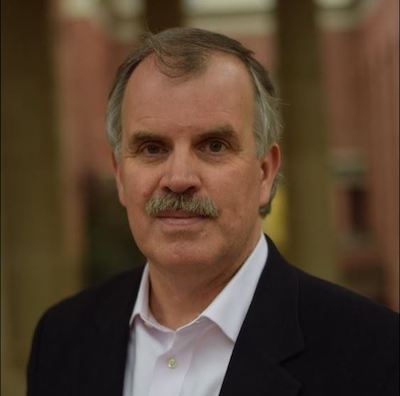
“I’m afraid they’re going to fire him, and even more so, I’m afraid they’re going to dissolve that office altogether,” they said of the Ombuds.
Jones said Caffera “guided” them “every step of the way” through workplace issues in recent years. They said they would not call him an “advocate,” but an “impartial” mediator who “knows the system” and “can help you navigate it in a moment that’s extraordinarily traumatizing.”
“I felt so helpless and pushed around, and I said, ‘I just don’t have any agency here.’ And he made me realize that in fact I did. I do have choices,” Jones said. “It’s closed off here and limited, but he said, ‘You are not helpless here. You do have a few protections that you can exercise.’ And that was helpful.”
Another faculty member, Ruth Ford, whose name has also been changed to protect his or her identity, echoed those sentiments, saying Caffera “is on my speed dial.”
“Because you write letters to the dean, you write letters to the provost, and they either ignore a faculty member or tell you they’re going to look into it or worse,” Ford said. “And Paul Caffera makes things happen in terms of facilitating conversations, and those conversations are needed. He has done a lot of good for this university.”
But the faculty member said they worry there is a “plot” to “get rid of Paul.”
“People would be terrified of speaking up because people who speak up get hammered at this university,” Ford said. “There is no place on campus where somebody can go except for the ombuds office to be treated fairly and with respect. Paul Caffera as the ombudsman is the only place women can go and talk about their concerns.”
Jones said the same.
“If they took the Ombuds office away, there would be nowhere for a faculty or staff person to go. Nowhere. That’s our last refuge, that’s the only place we have on campus,” Jones said. “That’s our last line of defense before going to the press or getting lawyers.”
When the Mississippi Free Press spoke to sources for the initial three-part UM Emails report, multiple people familiar with issues in the journalism school and the university overall described “a culture of fear” and said “witch hunts” had followed employees’ past attempts to reveal information administrators had sought to keep secret. Like the ones interviewed for this story, most of those sources spoke to this publication on condition of anonymity out of fear of reprisal.
Survey: 60% of Faculty Considered Leaving UM
Last year, before the whistleblower began contacting faculty members, a UM survey on the campus social climate revealed that 60% of university faculty and 55% of staff members had considered leaving the university in the past year.
Among survey respondents, 71 employees and 561 students reported unwanted “sexual interactions” or “unwanted sexual contact,” including sexual harassment, rape, fondling or cat-calling, during their time at UM. One survey respondent, an employee, said that university officials did not take their report of unwanted sexual activity seriously.
“A colleague told me to keep quiet about it, But I told my chair about it anyway, and he (characteristically) looked nervous about what had happened in ‘his’ department but did not report it to Title IX,” the employee said. “I reported it to Title IX, and they ‘forgot’ to follow up because they were ‘busy.’ My last resort (on the advice I got from HR) was to talk to University Counsel. That was almost 6 months ago. They promised to get back to me but did not.”
A number of respondents either described or said they had witnessed instances of corruption and nepotism on campus.
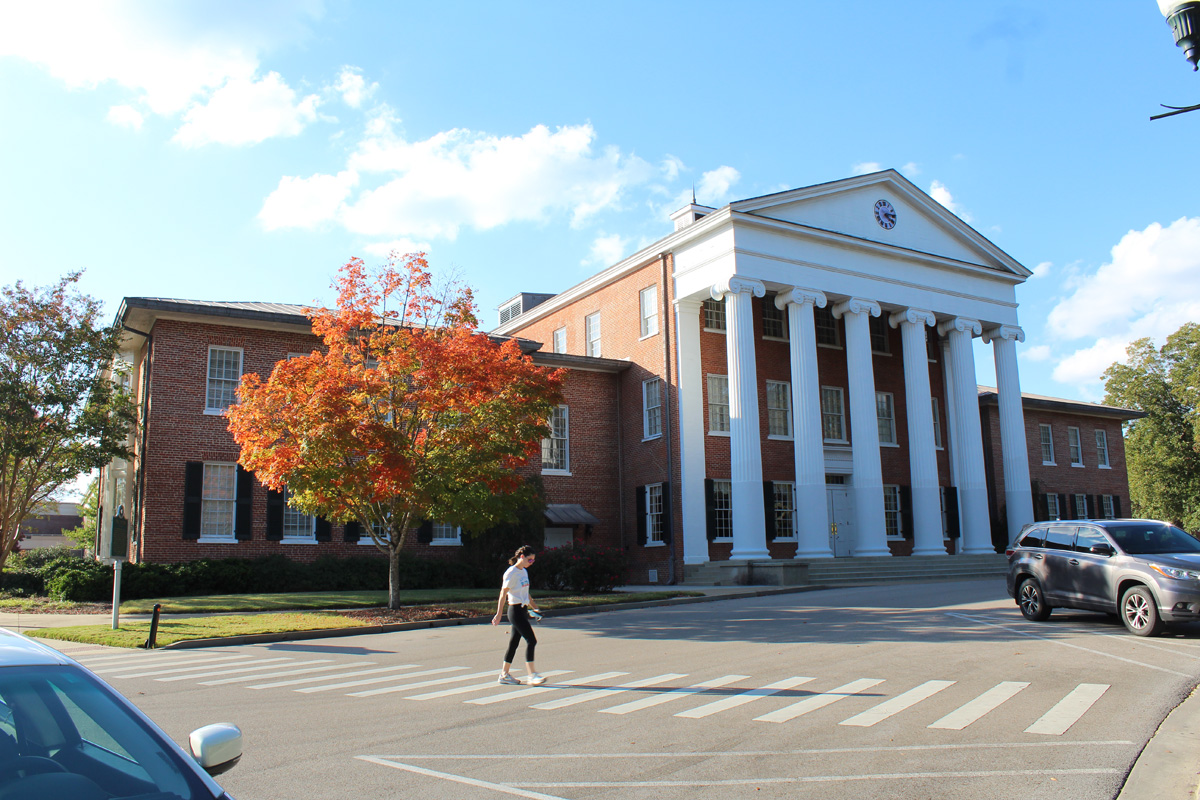
“A director recommended his son-in-law for a management position that reported directly to him. When one person on the hiring committee pointed out that someone might feel uncomfortable/fear retaliation when coming to him with a complaint against his son-in-law, the director became enraged,” the survey taker wrote. “The whole department was retaliated against. (No raises, given new job descriptions, refused to replace broken equipment.)”
Mississippi Free Press reporter Christian Middleton first reported on the climate survey results last month after receiving copies of the report from several sources, including Ole Miss Information. The whistleblowers obtained the report, which was not publicly available for download to non-students or employees, through a public-records request.
Now, some faculty members on campus who have shared their troubles with the Office of Ombuds worry that university officials could violate rules that are supposed to ensure their communications with Caffera remain private—opening them up to public exposure and possible acts of reprisal.
Ombuds Charter Forbids Most Disclosures
Though Caffera declined to speak about the lawsuit and the university’s investigation of the whistleblowers, his attorney, Goodloe Lewis, did send the Mississippi Free Press a statement on Dec. 2 explaining why the ombudsman decided to take matters to court.
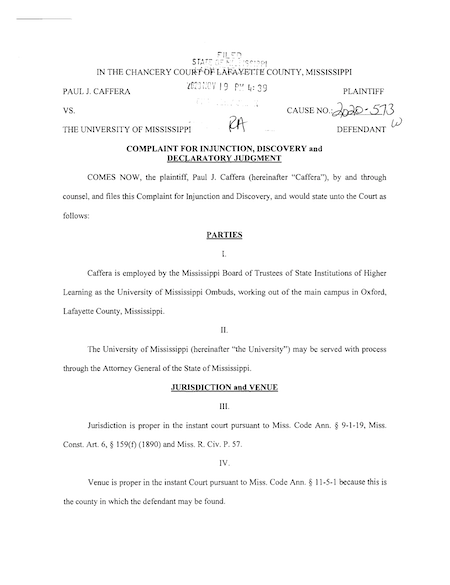
“On November 19, 2020, Paul J. Caffera, Ombuds at the University of Mississippi, filed a complaint in the Chancery Court of Lafayette County, Mississippi, for the purpose of protecting the confidentiality and independence of the Ombuds Office, and in particular to protect the anonymity of University employees and graduate students who have sought his assistance as Ombuds,” his attorney, Goodloe Lewis, said in a Dec. 2 statement to the Mississippi Free Press.
Lewis said the 2015 University of Mississippi charter that established the Office of Ombuds “expressly prohibits Mr. Caffera’s disclosure of the identity of persons using the Office of Ombuds, as well as any information they provide, except to prevent imminent harm.”
The charter also forbids the ombudsman from testifying or turning over records related to university investigations “even if requested to do so by the (Office of Ombuds) visitor.”
“Nonetheless, the University Equal Opportunity/Regulatory Compliance Office is conducting an investigation of an alleged hostile work environment at the School of Journalism and New Media wherein it seeks to compel Mr. Caffera to disclose confidential information, including the names of persons who have come to him with an expectation of confidentiality,” Lewis said. The 2015 charter says “the university shall not tolerate retaliation against individuals for use of the Office of the Ombudsperson” and that “the ombudsperson shall be protected from retaliation as a result of his/her role.”
An ‘Ambush’ of Allegations?
UM EORC Interim Director Gene W. Rowzee first requested a meeting with Caffera on Oct. 13, emails attached as exhibits to the ombudsman’s legal complaint show.
“Paul, my office is conducting a personnel investigation and I need to meet with you via Zoom on Thursday or Friday of this week,” Rowzee wrote that morning, offering no details at first. “What is your availability on those two days?”
Caffera replied, pointing Rowzee to the 2015 charter’s language saying that the ombudsperson “shall not … participate in any formal investigation or adjudication process.” That, the ombudsman wrote, precluded him from assisting the EORC in personnel investigations.
“Paul, I certainly understand your position,” Rowzee wrote back. “However, in all fairness, I need to tell you that part of what I am investigating are allegations against you, personally. The meeting would be your opportunity to present your side, as well as point me toward any witnesses or information you need me to explore before I complete my investigation.
“At the end of the investigation, I will be promulgating a personnel report that will include findings and recommendations which might affect you as a university employee.”
Caffera responded, saying he was “frankly shocked” to learn that someone had lodged a complaint against him, but knew there was a “danger” that people “displeased with issues an ombuds brings forward” might “make baseless claims against them.”
The ombudsman told Rowzee that he would need to know specifics about the allegations against him so he could consult with counsel. Caffera also noted that the 2015 charter says “the Office of the Ombudsperson shall have access to independent legal counsel when necessary in order to fulfill the functions of the position.”
Otherwise, Caffera said, “any ‘findings or recommendations’ will not be a legitimate investigatory process.”
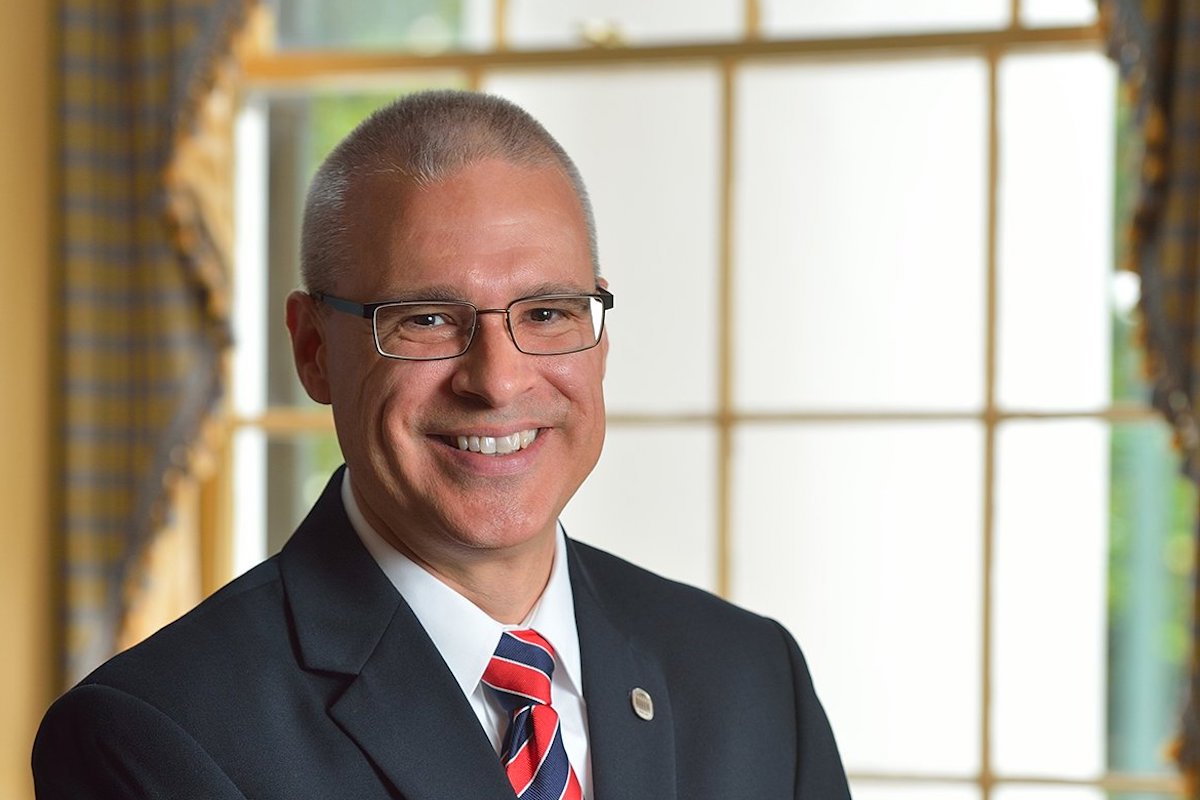
“Again, with all due respect, I feel like, had I not raised the issue of the inappropriateness of the Ombuds Office participating in a formal investigatory interview, it was your intention to ambush me with allegations at our meeting,” Caffera wrote. “Having served as an arbitrator for many years, I know what fair investigatory processes are, and that is not remotely fair.”
The EORC interim director replied later that afternoon.
“Paul, thank you for your response. I will consider your comments and contact you again if necessary. For now I will understand your below response to be a ‘no,’ that you will not be available to meet Thursday or Friday of this week,” Rowzee wrote. “Good luck and have a great day!”
The ombudsman wrote back again half an hour later, saying he would be “happy to meet at the appropriate time once I have had an opportunity to discuss the situation with the appropriate leadership.”
“Inasmuch as the Office of the Ombuds and the University Ombuds are one and the same, I have reason to believe any spurious complaint against me is as much an attack against the Ombuds Office,” Caffera wrote. “I have no intention to be at all difficult; however, I am aware that there are people on campus who have had wrongdoing exposed via the intervention of the Ombuds Office. It is not hard to envision someone attempting to neutralize the Ombuds Office’s effectiveness by lodging a baseless complaint against me.”
‘On the Basis of Race and National Origin’
Caffera’s attorney, Lewis, ultimately met with Rowzee over Zoom on Nov. 13. Caffera did not participate or answer any questions. After a quick introduction and a few remarks about technological difficulties with virtual meetings, the EORC interim director offered a vague explanation of his investigation.
“OK, so what has happened is, uh, earlier in the semester I, uh, I received some complaints and concerns from, uh, folks in the School of Journalism and they were saying that, that there was a hostile work environment being created on the basis of race and national origin and just in general, and so when they made that complaint, I began an investigation, and it’s a personnel investigation,” Rowzee said, according to a transcript attached to the ombudsman’s lawsuit.
The investigator told Lewis he had spoken to about 30 people over the course of the investigation so far.
“So, there is a belief among some of the folks over there that he may be causing or contributing to this hostile work environment, uh, in the School of Journalism and it has to do with anonymous emails and online trolls,” Rowzee told Caffera’s counsel. “There is also a belief among some over there that, uh, he may be using his public office to pursue a personal grudge for a friend or an intimate.”
The ombudsman’s lawsuit denies those charges, saying “Mr. Caffera has never under any circumstance in his role as University Ombuds used his position to ‘pursue a personal grudge for a friend or intimate.’” Lewis does not identify any alleged “friend or intimate” by name.
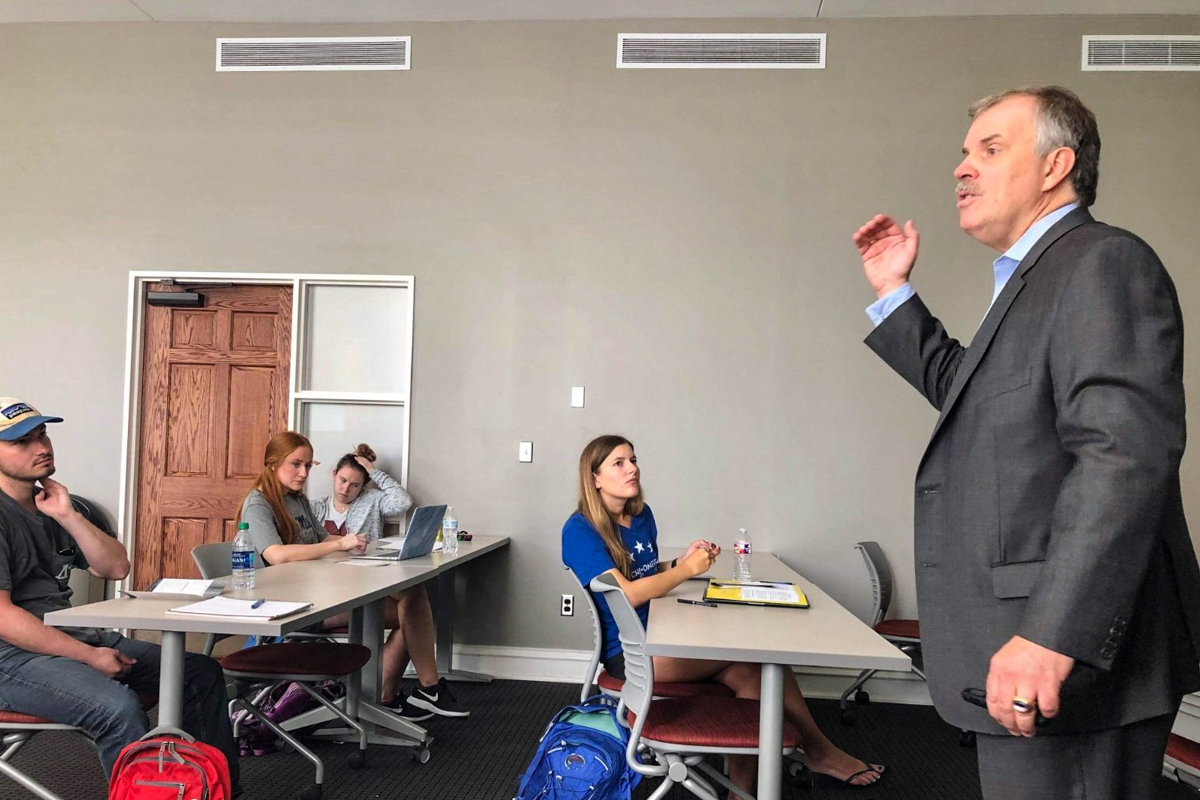
In the Nov. 13 Zoom meeting transcript, Rowzee told Lewis that he was “finishing up” his investigation.
“I’m doing some IT stuff, and, uh, looking at some computers, and, I, and, and really, I, I just, I just want to know what’s going on,” the transcript reads. “I, I just want to try to find out what the story is, uh, so I can complete my investigation.”
The EORC interim director then said that his investigation was not about this publication’s UM Emails reports.
“And this is not, as far as my investigation goes, this is not an investigation that has anything to do with the Mississippi Free Press Article or, or Dean Norton, or any of that stuff, this is, except tangentially, if that helps me identify the folks that, uh, that I need to talk to, so that’s where I am,” Rowzee said.
The topic of his investigation, though, draws on the fallout that occurred after this publication reported on the anonymous whistleblowers’ claims about the relationships between UM officials and wealthy alumni who repeatedly expressed bigoted attitudes. Correspondence the Mississippi Free Press examined for the UM Emails series shows that Caffera has butted heads with leaders in the journalism school in the past, too.
‘The Values We Hold Dear’
The Mississippi Free Press first began receiving thousands of documents and emails from the whistleblowers in April. The whistleblowers obtained the documents through a series of public-records requests to the university in the spring.
“You know Oxford and Ole Miss have real problems when black hookers are working on Jackson avenue. The African American visitors were competing for her affection,” read one September 2018 email that wealthy UM alumnus Blake Tartt, a Houston businessman, sent to then-UM School of Journalism and New Media Dean Will Norton. “It made me sick. … I happen to know what happens when a place is overtaken by the wrong elements.”
As he did in numerous other instances, Norton responded without criticizing the wealthy businessman whom he hoped would give a sizable donation to the school.
“Blake, I have been really disappointed for a long time with the way this culture is going,” the journalism dean wrote back the next morning.
The journalism dean continued to pursue meetings with Tartt and financial support even as the real-estate businessman made other racist remarks, such as using an ape emoji to refer to Black tennis superstar Serena Williams.
Days after Norton received Tartt’s photos of Black women in a tight-fitting clothes on The Square, the journalism school’s founding donor and namesake, Ed Meek, used one of Tartt’s photos in a Facebook post calling on others to “protect the values we hold dear that have made Oxford and Ole Miss known nationally.”
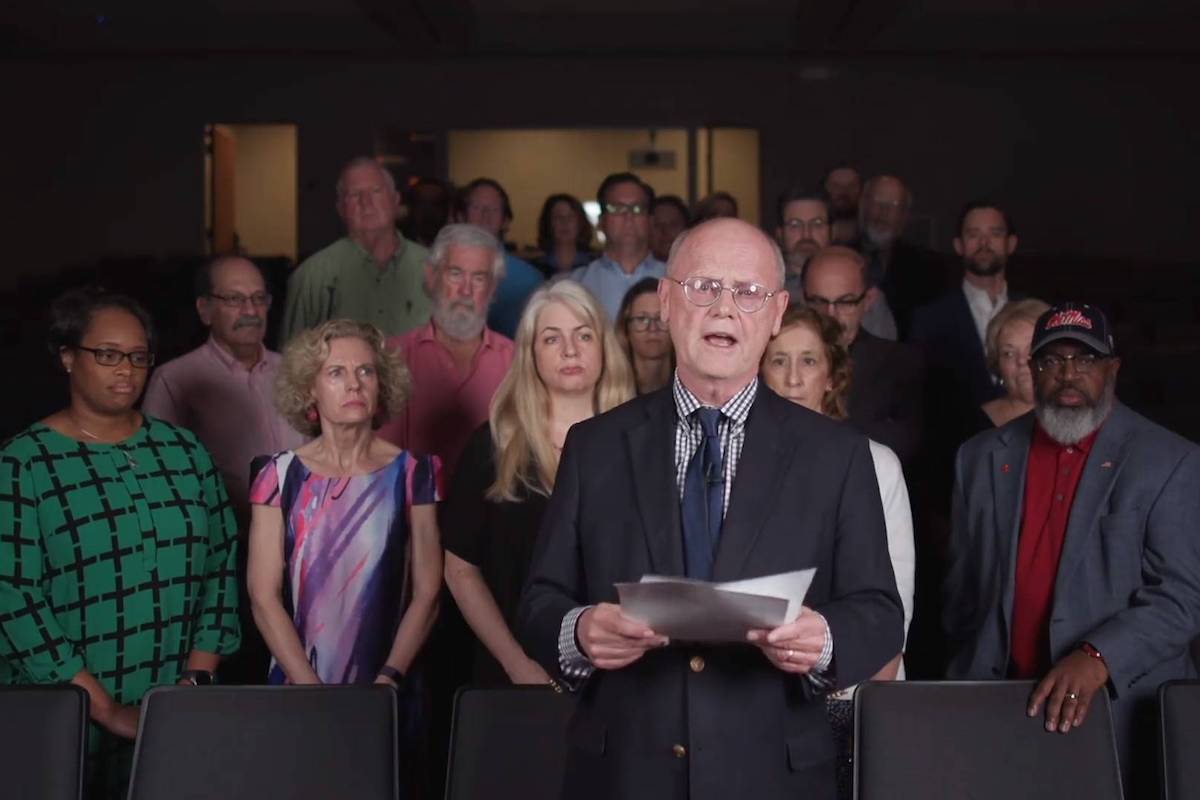
Then-UM Chancellor Jeffrey Vitter also put out a statement that day, condemning Meek’s post for having an “unjustified racial overtone”—remarks Dean Norton would echo the next day, decrying Meek for his “reprehensible” words and calling for his name to be removed from the journalism school, but without saying he had already received the photo with similar remarks in emails from Tartt. The dean and other UM officials also continued courting Tartt’s support for the school, the emails show.
The school erased Meek’s name from its building soon after, but Norton did not speak up about Tartt’s role despite having received the emails. After Vitter stepped down later that fall, Tartt served on the committee that helped select the new UM chancellor, Glenn Boyce. Emails show the journalism dean continued courting Tartt’s financial support for more than a year after the Meek incident.
Sources told the Mississippi Free Press that, aside from Norton, others in the journalism faculty and members of the administration were at least somewhat aware of Tartt’s involvement in the photos that made their way to Meek’s Facebook.
The Mississippi Free Press obtained a recording of a Sept. 20, 2018, journalism faculty meeting the day after Meek’s viral post. In it, members can be heard discussing the source of the photos—and the likelihood that Tartt was the source.
This publication was not the first to report on parts of that meeting, though. Then-Mississippi Today reporter (now editor-in-chief) Adam Ganucheau first reported some of the aforementioned remarks from the Sept. 20 Meek School of Journalism and New Media faculty meeting, which occurred the day after Ed Meek’s infamous Facebook post. Ganucheau had obtained a copy of the recording of the meeting from an anonymous source.
‘Treacherous Behavior’
Though Ganucheau’s story, which published on Oct. 18, 2018, quoted some of the same remarks as the Mississippi Free Press reported nearly two years later, it omitted the fact that two faculty members in the meeting pegged Blake Tartt as the source for photos, as the recording revealed.
“Meek, who was traveling the weekend of the Ole Miss-Alabama game, did not take the photos of the women, but received them from an acquaintance in Oxford,” the Mississippi Today story reads. “The story idea Meek passed along was that prostitution and fights were hurting Oxford’s character and long-term financial viability, implying that the women in the photos were sex workers.”
Mississippi Today is a nonprofit outlet, and Norton served on its board of directors at the time. Ganucheau told the Mississippi Free Press this past summer in a statement that the former journalism dean did not influence his reporting one way or the other, though. He said he did not name Tartt in the story because he had not been able to verify him as the source.
The Mississippi Free Press was unable to ask Ganucheau, who declined an interview and sent a statement instead, if he had asked Norton after receiving the recording whether he knew if Tartt had provided the photos to Meek.
Despite Norton’s role at Mississippi Today, sources told the Mississippi Free Press earlier this year that Ganucheau’s story kicked off “a witch hunt” in the journalism school. Norton and some faculty members, the sources said, were eager to uncover the identity of the person who had taped the meeting and turned the recording over to Ganucheau—much as several journalism faculty members were in August 2020 after this publication’s UM Emails series released, even insisting that Editor Donna Ladd provide names of faculty members this publication reached out to, which she declined to do in order to protect confidential sources.
Correspondences that whistleblowers obtained through public-records requests in the spring appeared to back up sources’ claims about a 2018 unmasking effort.
“Many faculty are upset about this breach of confidentiality and what I would call treacherous behavior that has the potential to breed distrust among our faculty and staff,” Dean Norton wrote in one fall 2018 email to Provost Noel Wilkin and UM Chief Legal Officer and General Counsel Erica McKinley.
Ombudsman Caffera later became aware of the “witch hunt” that fall, emails from the public records trove show. On Dec. 12, 2018, Caffera emailed Scott Fiene, an assistant dean in the School of Journalism and New Media, asking for copies of advertisements for an unspecified August 2018 hiring search that a faculty member had anonymously raised concerns about.
Fiene wrote back that day and copied his email to Journalism Dean Will Norton, Provost Noel Wilkin and Associate Provost Donna Strum.

“Paul, I have been told to refer you to HR on this,” Fiene wrote.
By Dec. 17, though, the ombudsman still had not received the ads.
“Since our earlier convo I have been advised that if a faculty member has a concern about a search, they are to be referred to the appropriate area (HR, EORC, Search Chair, etc.) for information,” Fiene wrote. “I hope you will convey that to the faculty person or persons who has complained.”
Caffera replied that evening in an email he copied to Rowzee at the EORC.
“Scott, the University of Mississippi created the Office of the Ombuds in order to provide employees with a confidential avenue to address issues affecting their work life, especially when they have fear of raising issues, concerns, or complaints in their own name either through or outside of their chain of command,” the ombudsman wrote.
“With all due respect to you and other administrators in JNM (the School of Journalism and New Media), no administrator on this campus may require an employee to forego using the services of the Office of the Ombuds in order to address concerns they may have with their workplace, regardless of whether those concerns are founded or unfounded.”
Only employees could ascertain whether they “have a reason to be fearful of raising a concern,” Caffera wrote—“not that employee’s leadership or anyone else on campus.”
The ombudsman then cited the uproar that erupted in the journalism department after the Oct. 18, 2018, Mississippi Today report, writing that the “alleged recent efforts of JNM Leadership to persuade a reporter to reveal the name/names of the source/sources” of the recording “might reasonably persuade an employee of JNM that JNM Leadership could be inclined toward vindictiveness.”
“Allegedly, during a Nov. 30, 2018 JNM School meeting, Dean Norton informed the JNM faculty of the School’s attempts to uncover the identity/identities of Ganucheau’s source/sources,” Caffera wrote.
In Caffera’s Dec. 17, 2018, email, the ombudsman said that he had “always enjoyed (his) conversations” with the journalism dean. “That said, given the circumstances noted above, it does not appear unreasonable for some employees of JNM to have concerns about coming forward without the cloak of anonymity that the Ombuds Office is able to provide,” he wrote.
In an email to Fiene, Wilkin, Norton, Strum and Rowzee later that night, though, UM General Counsel Erica McKinley directed the administrators not to turn any information over to Caffera.
“Please know that the General Counsel’s office will respond and manage any further information from Paul on the matters discussed below,” McKinley wrote. “Please do not provide Paul any requested material, whether email, documents, or recordings. If Paul engages you again or if you receive any further requests from Paul, please direct him to the General Counsel’s office. In issuing this directive, I am not usurping or otherwise intruding upon the authority of the EORC or HR.”
Although McKinley marked her email “privileged and confidential” and as “attorney client communication,” it appeared in the trove of public-records the university turned over to the whistleblowers this past spring.
Faculty Member Grappled With Norton-Tartt Emails
On March 30, 2020, the ombudsman wrote to Provost Wilkin saying he had received copies of dozens of emails between Dean Norton and Blake Tartt. Caffera said the trove included emails “that (a) faculty member found disparaging to homosexuals in general, and to UM alumnus Shepard Smith in particular.”
“Reportedly, there are dozens of other emails related to Dean Norton and other sensitive/incendiary matters,” Caffera wrote, adding that the emails had “made their unsolicited way to (a) faculty member” who “has felt intimidated by Dean Norton in the past.”
The faculty member, Caffera continued without identifying the person by name, was “concerned that the emails may find their way to the press.”
“The faculty member is concerned that if they bring the e-mails forward to Journalism School leadership they might face sanction; likewise, they are concerned that if they do not bring them forward they may run afoul of reporting obligations under University policy,” Caffera wrote. “Further, they are reluctant to ask other JNM faculty whether they have also received similar e-mail correspondence.
“They have asked me to ask you whether they would be protected by the University’s whistleblower protection policy if they come forward to you, as the person directly above Dean Norton in the chain of command.”
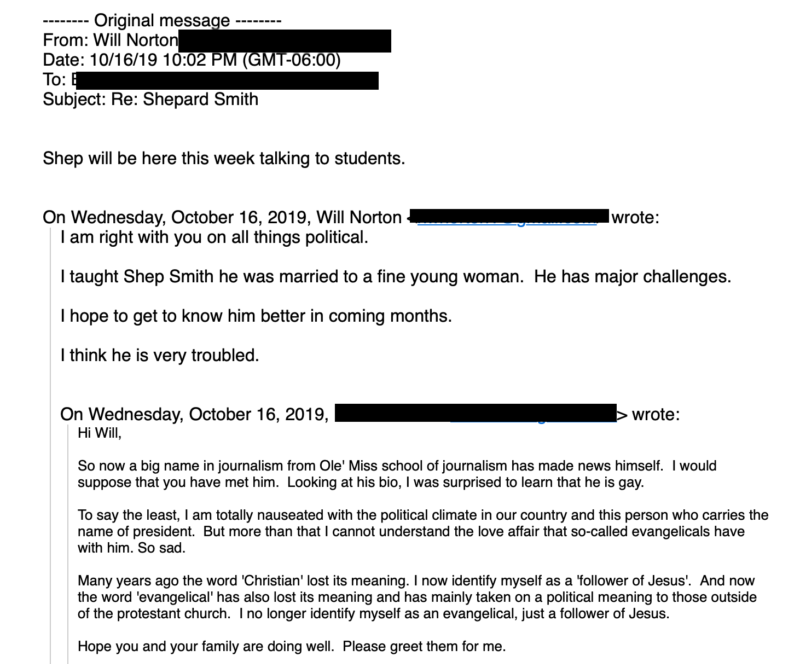
But Wilkin had already received copies of the emails a day before. They had begun circulating soon after McKinley, the general counsel, fulfilled Ole Miss Transparency’s initial public-records request. A subsequent set of emails from an additional public-records request shows that the provost forwarded them to Norton.
The records showed that, after Norton first received the request for his emails with Blake Tartt and others in mid-March, he floated the idea of resigning in hopes of preventing his emails from becoming public. “Erica, would it do any good if I just resigned as dean? Would the person then relent?” Norton asked McKinley, the general counsel, in one mid-March email.
On April 23, Norton told the journalism faculty during an 11 a.m. Zoom meeting that he was planning to meet with the provost later that afternoon. Several hours later, at 4:51 p.m., Provost Wilkin sent an email to the school announcing that Norton had “decide(d) to return to the faculty.”
“It’s important for me to have some free time now, but it’s also important for me not to go totally to free time,” Norton told journalism school faculty in a meeting several days after the announcement. “So that’s why I decided to teach, and I would like to see what students are truly like in the classroom now compared to when I was teaching full time.”
Norton has not taught since stepping down as dean, though, neither in the summer or fall semesters. Documents the Mississippi Free Press requested from the Mississippi Institutions of Higher Learning show that the former dean has continued to receive a handsome salary with his administrative pay boost intact—even though IHL rules say such benefits “shall not be paid to the faculty member when he or she ceases to hold the administrative position.”
Provost Wilkin told the Mississippi Free Press last month that the university is not violating IHL guidelines, but instead using its own pay formula to calculate changes in pay for an employee who returns to the faculty from an administrative role. The policy the provost cited, though, refers only to “department chairs”—not other administrators such as deans.
“In the absence of a policy for every administrative title or role, we have applied the approach outlined in the chair’s policy consistently with all administrative positions, in addition to the chairs,” Wilkin told the Mississippi Free Press last month.
‘Lord Help Us All’
After the Mississippi Free Press first broke the story on the Norton emails in August, Wilkin and Debora Wenger, the interim journalism school dean, made several public statements vowing to improve the climate at the university. Neither directly mentioned Norton’s role in the Meek affair nor his interactions with Blake Tartt, and neither has agreed to be interviewed, choosing to communicate through statement.
There is no public indication that any official body at the university opened an investigation into Norton or the university’s donor practices after the Norton-Tartt emails became public.
Ford, who, like Jones, is not a member of the journalism faculty, read the UM Emails series. The lack of action was not surprising, they said; it was familiar.
“Faculty and staff are trying to talk, but administrators refuse to listen,” Ford told the Mississippi Free Press. “All people want is to be treated fairly and be listened to. When you have wrongdoing, you need to address it.”
Instead, anonymous sources on campus believe leadership has, once again, focused on rooting out whistleblowers.
“The Ombuds Office should be a rock. It should be a safe haven,” Ford said on Dec. 2. “It should be a neutral zone. And if Paul Caffera is at risk of losing his job, then Lord help us all. Because if he can’t talk and speak up about injustice on the campus, then who can? Nobody is safe.”
Note: The original story above used attorney Goodloe Lewis’ first name instead of last name in several references. The inadvertent error has been corrected in the text.
Editor’s Note: In the reporting of the UM emails series and follow-up reports, the MFP did not confer with members of either of our boards or any donors associated with the University of Mississippi to avoid conflicts of interest.
Also see: From Racist Emails to ‘Witch Hunts’: A UM Emails Timeline
Watch: Reporter Ashton Pittman and Editor Donna Ladd discuss the series during the 2021 Ancil Payne Award for Ethics in Journalism ceremony (40:00) and read more about the award here.
Read the full UM Emails reporting series to date:
- ‘The Fabric Is Torn In Oxford’: UM Officials Decried Racism Publicly, Coddled It Privately
- ‘The Ole Miss We Know’: Wealthy Alums Fight To Keep UM’s Past Alive
- UM’s ‘Culture Of Secrecy’: Dean Quit As Emails Disparaging To Gay Alum, Black Students Emerged
- ‘Appalling’: UM Provost Decries ‘Hurtful’ Emails About Black Women, Gay Alum
- Ole Miss’ Coddle Culture: Ole Miss Will Stay ‘Ole Miss’ Without Radical Shift
- EDITOR’S NOTE: The Decisions, Process, Motives Behind Ashton Pittman’s Series On UM Emails
- Perpetuating Patterns: It’s Time To Build A Better University Of Mississippi
- After UM Emails, Dean Plans ‘Anti-Racist’ Training, Donor Changes to ‘Remake Our School’
- ‘Ole Miss’ Vs. ‘New Miss’: Black Students, Faculty On How To Reject Racism, Step Forward Together
- UM Closely Guards Climate Survey Providing Window Into Social Issues, Sexual Violence
- UM Probes Whistleblowers Who Exposed Racist Emails As Ex-Dean Keeps $18,000 Monthly Salary
- ‘Our Last Refuge’: UM Faculty ‘Terrified’ As Officials Target Ombuds In Bid To Unmask Whistleblowers
- ‘Like He Was Disappeared’: UM Faculty Fear Retaliation After Ombudsman Put On Leave
- UM Appoints Acting Ombuds As Weary Faculty See Effort To ‘Stamp Out’ Anti-Racism Voices
- UM Retaliating Against Ombudsman for Protecting Visitors’ Privacy, Org Says
- UM Accuses Ombudsman of ‘Raising False Alarms’ Over Whistleblower Investigation
- A Matter Of Trust: UM Controversy Shows How Ombuds Programs Should, Shouldn’t Function, Expert Argues
- UM Pursuing ‘Criminal Investigation’ Into Whistleblowers Who Exposed Racist Emails
- Ombuds ‘Exonerated’ As UM Emails Whistleblower Hunt Fails to Identify Sources
- Will Norton, Ex-Dean in ‘UM Emails’ Race Saga, Quietly Departs University

